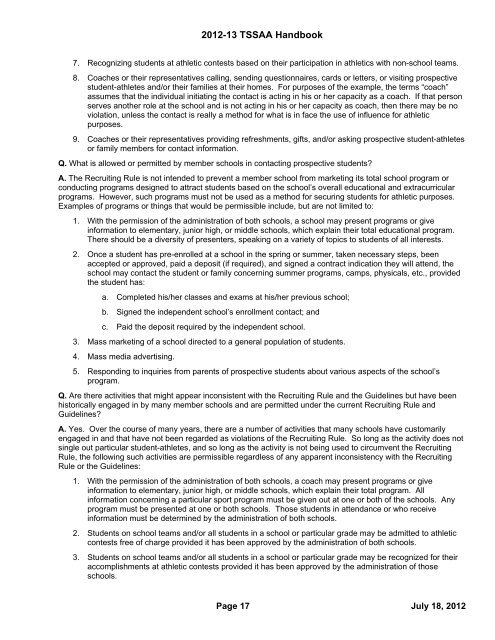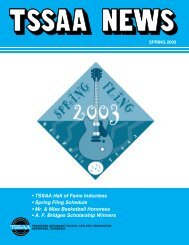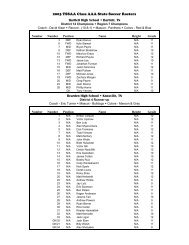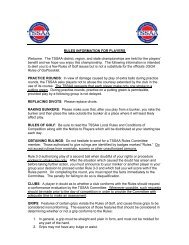2012-13 TSSAA Handbook
2012-13 TSSAA Handbook
2012-13 TSSAA Handbook
Create successful ePaper yourself
Turn your PDF publications into a flip-book with our unique Google optimized e-Paper software.
<strong>2012</strong>-<strong>13</strong> <strong>TSSAA</strong> <strong>Handbook</strong><br />
7. Recognizing students at athletic contests based on their participation in athletics with non-school teams.<br />
8. Coaches or their representatives calling, sending questionnaires, cards or letters, or visiting prospective<br />
student-athletes and/or their families at their homes. For purposes of the example, the terms “coach”<br />
assumes that the individual initiating the contact is acting in his or her capacity as a coach. If that person<br />
serves another role at the school and is not acting in his or her capacity as coach, then there may be no<br />
violation, unless the contact is really a method for what is in face the use of influence for athletic<br />
purposes.<br />
9. Coaches or their representatives providing refreshments, gifts, and/or asking prospective student-athletes<br />
or family members for contact information.<br />
Q. What is allowed or permitted by member schools in contacting prospective students?<br />
A. The Recruiting Rule is not intended to prevent a member school from marketing its total school program or<br />
conducting programs designed to attract students based on the school’s overall educational and extracurricular<br />
programs. However, such programs must not be used as a method for securing students for athletic purposes.<br />
Examples of programs or things that would be permissible include, but are not limited to:<br />
1. With the permission of the administration of both schools, a school may present programs or give<br />
information to elementary, junior high, or middle schools, which explain their total educational program.<br />
There should be a diversity of presenters, speaking on a variety of topics to students of all interests.<br />
2. Once a student has pre-enrolled at a school in the spring or summer, taken necessary steps, been<br />
accepted or approved, paid a deposit (if required), and signed a contract indication they will attend, the<br />
school may contact the student or family concerning summer programs, camps, physicals, etc., provided<br />
the student has:<br />
a. Completed his/her classes and exams at his/her previous school;<br />
b. Signed the independent school’s enrollment contact; and<br />
c. Paid the deposit required by the independent school.<br />
3. Mass marketing of a school directed to a general population of students.<br />
4. Mass media advertising.<br />
5. Responding to inquiries from parents of prospective students about various aspects of the school’s<br />
program.<br />
Q. Are there activities that might appear inconsistent with the Recruiting Rule and the Guidelines but have been<br />
historically engaged in by many member schools and are permitted under the current Recruiting Rule and<br />
Guidelines?<br />
A. Yes. Over the course of many years, there are a number of activities that many schools have customarily<br />
engaged in and that have not been regarded as violations of the Recruiting Rule. So long as the activity does not<br />
single out particular student-athletes, and so long as the activity is not being used to circumvent the Recruiting<br />
Rule, the following such activities are permissible regardless of any apparent inconsistency with the Recruiting<br />
Rule or the Guidelines:<br />
1. With the permission of the administration of both schools, a coach may present programs or give<br />
information to elementary, junior high, or middle schools, which explain their total program. All<br />
information concerning a particular sport program must be given out at one or both of the schools. Any<br />
program must be presented at one or both schools. Those students in attendance or who receive<br />
information must be determined by the administration of both schools.<br />
2. Students on school teams and/or all students in a school or particular grade may be admitted to athletic<br />
contests free of charge provided it has been approved by the administration of both schools.<br />
3. Students on school teams and/or all students in a school or particular grade may be recognized for their<br />
accomplishments at athletic contests provided it has been approved by the administration of those<br />
schools.<br />
Page 17 July 18, <strong>2012</strong>






